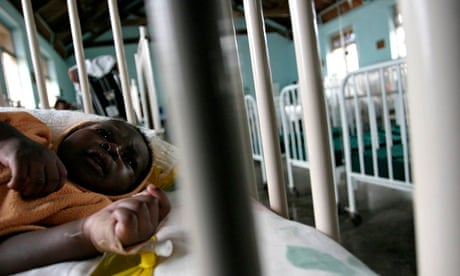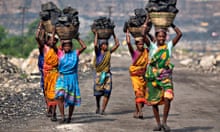Achieving global targets to reduce maternal and child deaths and increase access to improved sanitation facilities by 2015 is "slipping away", despite significant progress in the past 14 years, the UN has said.
In its annual assessment of where the world stands on meeting the eight millennium development goals (MDGs), set in 2000, the UN urged governments to intensify efforts on areas where little or no improvement had been made, in the final push towards next year's deadline.
According to the MDG 2014 report (pdf), which was published on Monday, the number of children dying before they reach five has almost halved in the past 20 years; the global maternal mortality ratio has dropped by 45%; an estimated 3.3 million deaths from malaria have been averted and the global target to improve access to safe water has been met. More goals were within reach if current trends continue, the report said.
Despite these achievements, however, the report, which draws on data compiled between 2010 and 2014 by more than 28 UN and international agencies, emphasised that only half of pregnant women in developing countries get the recommended four antenatal checkups; diarrhoea and pneumonia continue to be the main killers of under-fives; and 162 million children were experiencing preventable chronic undernutrition. More than 1 billion people still resort to open defecation, the majority of whom live in middle-income countries. Last month, the UN admitted there was no chance the goal for universal primary education would be met by next year.
In the foreword to the report, the UN secretary general, Ban Ki-moon, said: "The concerted efforts of national governments, the international community, civil society and the private sector have helped expand hope and opportunity for people around the world. But more needs to be done to accelerate progress. We need bolder and focused action where significant gaps and disparities exist."
The MDGs, signed by all UN member states, have been lauded for galvanising global action to end extreme poverty and hunger, achieve universal primary education, promote gender equality, reduce child mortality, improve maternal health, combat HIV, Aids, tuberculosis and malaria, ensure environmental sustainability and develop international partnerships.
But progress has been uneven between and within countries and regions. Many states will not achieve all of the goals by the 2015 deadline; some will not meet any. Based on regional averages, sub-Saharan Africa, for example, is not expected to meet any of the targets, except in halting or reversing the spread of HIV and Aids, which it could achieve if momentum is maintained. East, south-east and south Asia, meanwhile, are making progress in all categories.
The goals related to women – gender equality and reducing maternal and child deaths – are the most off track. Last year, the UN children's agency, Unicef, said the target to reduce child mortality by two-thirds would not be achieved until 2028 at the current rate of progress.
The 2010 deadline for achieving universal access to antiretroviral treatment that controls the HIV virus, contained in MDG six, has been missed and is unlikely to be reached by 2015 without greater attention.
Though the UN has called for a final push to meet the MDGs, an intergovernmental working group is drawing up plans for a new set of targets from 1 January 2016. The sustainable development goals (SDGs) will have a wider brief, incorporating economic and environmental issues. At the UN general assembly (UNGA) last year, member states agreed the new goals would be based on the principles of human rights and the rule of law.
Whereas the MDGs were billed as anti-poverty targets to be implemented by poorer countries and funded by wealthier states, all countries will be obliged to meet the SDGs by the anticipated 2030 deadline.
The latest draft from the working group, established under the 2012 Rio+20 conference communique, outlines 17 goals that range from ending poverty and hunger, providing quality education and empowering women, to ensuring access to justice for all, tackling climate change and reducing inequality. The working group will present its report to member states at the UNGA in September, after which member states will spend the following year thrashing out the details.
Ban said: "Member states are now fully engaged in discussions to define sustainable development goals, which will serve as the core of a universal post-2015 development agenda. Our efforts to achieve the MDGs are a critical building block towards establishing a stable foundation for our development efforts beyond 2015."
Fleur Anderson, global head of campaigns at the NGO WaterAid, said: "As the UN works on a renewed set of development goals, it is critical that sanitation be made a central priority in development. For the first time in history, bringing safe water and basic sanitation to everyone, everywhere, within a generation is in our grasp. But it will require political will and dedication to get there. Without these basic building blocks, there is no effective way to address extreme poverty."







